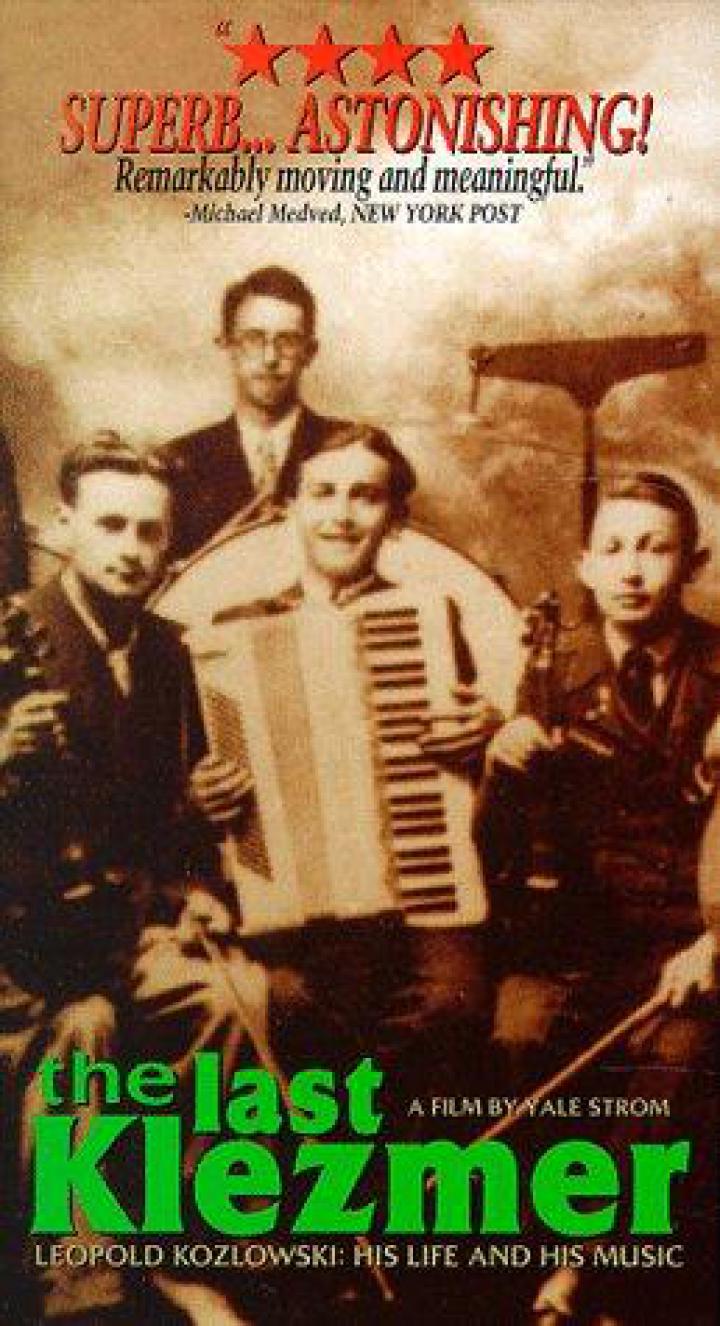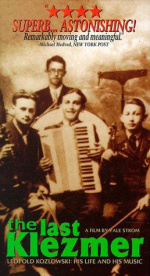Last Klezmer
The Last Klezmer
Twenty-Fifth Anniversary Screening
The propulsive Jewish folk music known as klezmer that was played by itinerant bands throughout Eastern Europe before World War II has earned many sobriquets, among them "Jewish jazz." The pumping rhythms, modal harmonies and cantorial cry of this European roots music have filtered into countless Broadway musicals. Probably no one did more to perpetuate klezmer traditions, especially in Europe, than Leopold Kozlowski, the subject of Yale Strom's absorbing documentary film "The Last Klezmer." A Holocaust survivor who recently died at an incredible 100 years, Mr. Kozlowski, whose original name was Leopold Kleinman, was the nephew of a noted klezmer clarinetist Naftule Brandwein, who immigrated to the United States in the 1920's.
Before the Holocaust, there were as many as 5,000 klezmer musicians performing in Eastern Europe. Mr. Kozlowski is one of the few who survived and who remained in Poland after the Holocaust. An indefatigable promoter of the music, he lived in Krakow and taught klezmer and Yiddish songs to students who were not Jewish but who regarded the music as an indigenous regional style.
Klezmer is nothing less than the "soul of the people," Mr. Kozlowski declares. To perform the music correctly, he insists, requires "real Jewish humor and feeling." And in scenes in which he plays the piano and sings, he demonstrates the mixture of robust drive and intense emotionality that animates the music at its most expressive. In an enlightening musical illustration, "Hello, Dolly" is played in a klezmer style that makes it sound exactly like a traditional Eastern European folk tune.
"The Last Klezmer" follows Mr. Kozlowski on a pilgrimage to Peremyshlyany, his hometown, south of Lviv in Ukraine. Beginning as an ebullient celebration of klezmer music, the movie gradually changes in tone, as he and a film crew visit sites of his childhood that stir up painful memories.
The heart of the movie is an oral history of Mr. Kozlowski's Holocaust experience, during which he lost both parents and his younger brother, Dulko, a gifted violinist. Visiting his father's grave in the forest outside the village, he falls to his knees and kisses the earth, weeping. At the home of his childhood piano teacher, he listens as her daughter recalls her mother's praise for his abilities. He is also joyfully reunited with a former partisan and fellow survivor whom he hasn't seen in 50 years.
Mr. Kozlowksi, who spent time in forced labor camps, reels off one horror story after another. In the saddest vignette he recalls how his brother was slain by anti-Semitic Ukrainian nationalists just one week before the arrival of the Russians.
With his mutton-chop sideburns and fondness for garlic (he demonstrates his cooking as well as his musical skills), Mr. Kozlowski emerges as an endearingly open-hearted man with a zest for life. It is clear how profoundly he was nurtured by the music he performed with such gusto.
The propulsive Jewish folk music known as klezmer that was played by itinerant bands throughout Eastern Europe before World War II has earned many sobriquets, among them "Jewish jazz." The pumping rhythms, modal harmonies and cantorial cry of this European roots music have filtered into countless Broadway musicals. Probably no one did more to perpetuate klezmer traditions, especially in Europe, than Leopold Kozlowski, the subject of Yale Strom's absorbing documentary film "The Last Klezmer." A Holocaust survivor who recently died at an incredible 100 years, Mr. Kozlowski, whose original name was Leopold Kleinman, was the nephew of a noted klezmer clarinetist Naftule Brandwein, who immigrated to the United States in the 1920's.
Before the Holocaust, there were as many as 5,000 klezmer musicians performing in Eastern Europe. Mr. Kozlowski is one of the few who survived and who remained in Poland after the Holocaust. An indefatigable promoter of the music, he lived in Krakow and taught klezmer and Yiddish songs to students who were not Jewish but who regarded the music as an indigenous regional style.
Klezmer is nothing less than the "soul of the people," Mr. Kozlowski declares. To perform the music correctly, he insists, requires "real Jewish humor and feeling." And in scenes in which he plays the piano and sings, he demonstrates the mixture of robust drive and intense emotionality that animates the music at its most expressive. In an enlightening musical illustration, "Hello, Dolly" is played in a klezmer style that makes it sound exactly like a traditional Eastern European folk tune.
"The Last Klezmer" follows Mr. Kozlowski on a pilgrimage to Peremyshlyany, his hometown, south of Lviv in Ukraine. Beginning as an ebullient celebration of klezmer music, the movie gradually changes in tone, as he and a film crew visit sites of his childhood that stir up painful memories.
The heart of the movie is an oral history of Mr. Kozlowski's Holocaust experience, during which he lost both parents and his younger brother, Dulko, a gifted violinist. Visiting his father's grave in the forest outside the village, he falls to his knees and kisses the earth, weeping. At the home of his childhood piano teacher, he listens as her daughter recalls her mother's praise for his abilities. He is also joyfully reunited with a former partisan and fellow survivor whom he hasn't seen in 50 years.
Mr. Kozlowksi, who spent time in forced labor camps, reels off one horror story after another. In the saddest vignette he recalls how his brother was slain by anti-Semitic Ukrainian nationalists just one week before the arrival of the Russians.
With his mutton-chop sideburns and fondness for garlic (he demonstrates his cooking as well as his musical skills), Mr. Kozlowski emerges as an endearingly open-hearted man with a zest for life. It is clear how profoundly he was nurtured by the music he performed with such gusto.
Genre
Documentary,
Music,
Jewish Culture
Runtime
130
Language
English,
Polish,
Yiddish,
Russian
Director
Yale Strom
Cast
Leopold Kozlowski
Played at
Fine Arts Theatre 11.03.19 - 11.03.19
The Last Klezmer Get Tickets
There are currently no showtimes for this film. Please check back soon.

